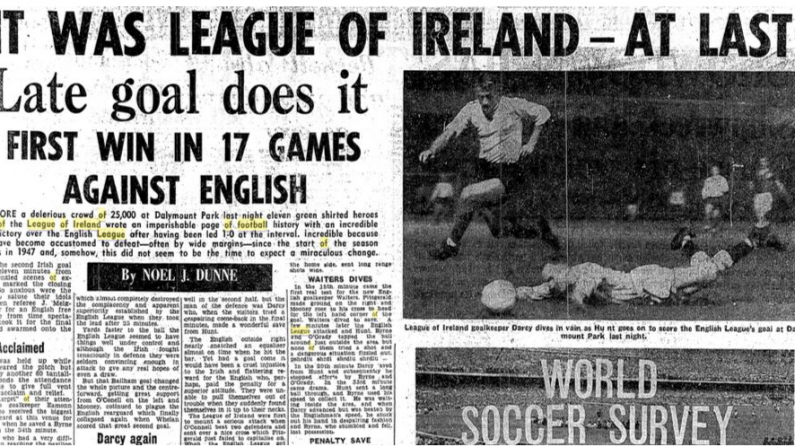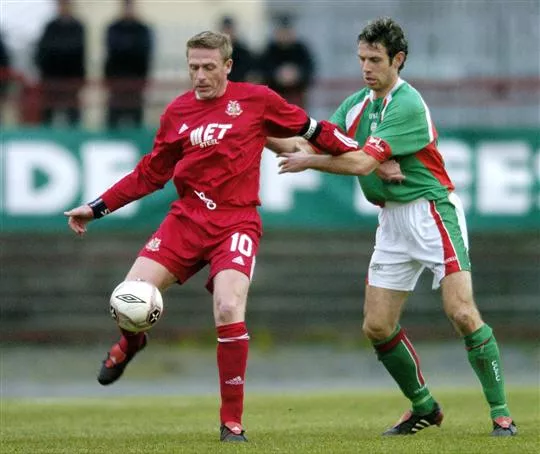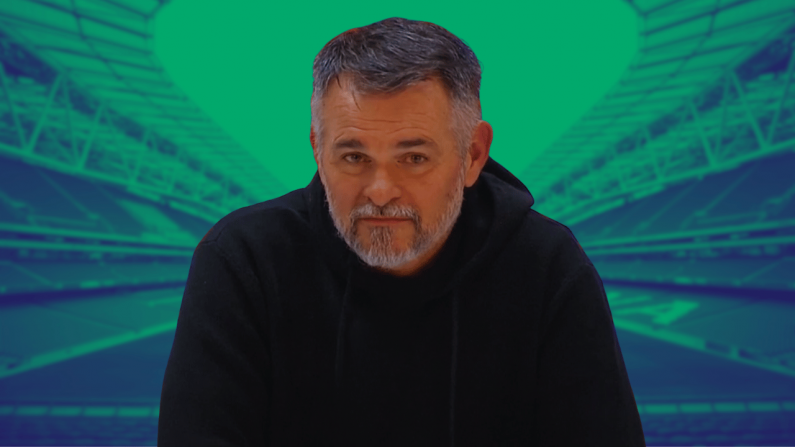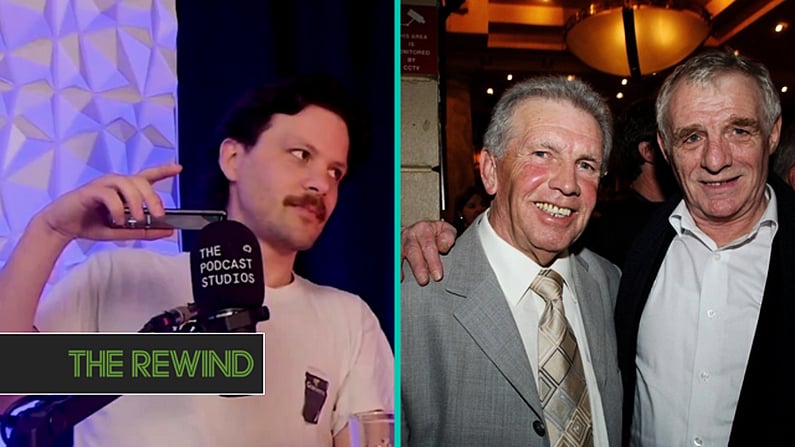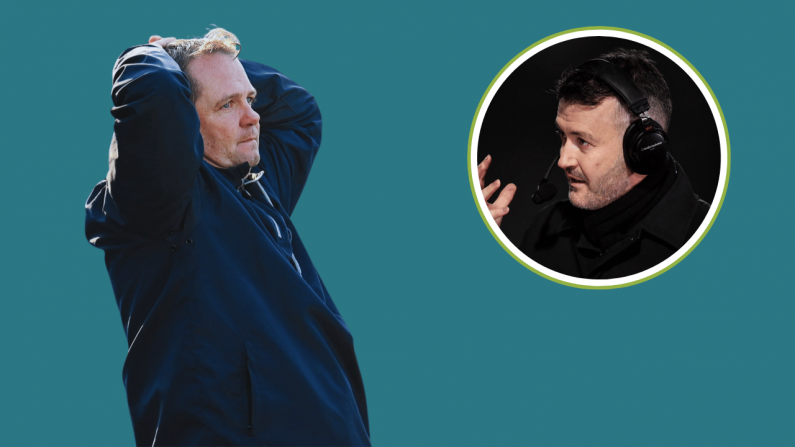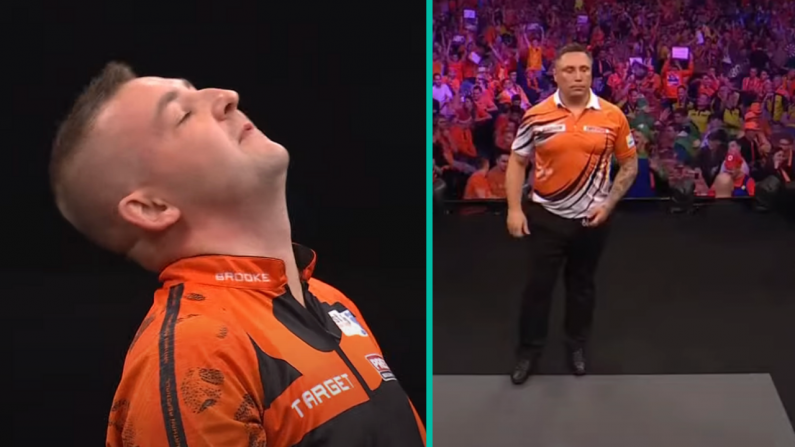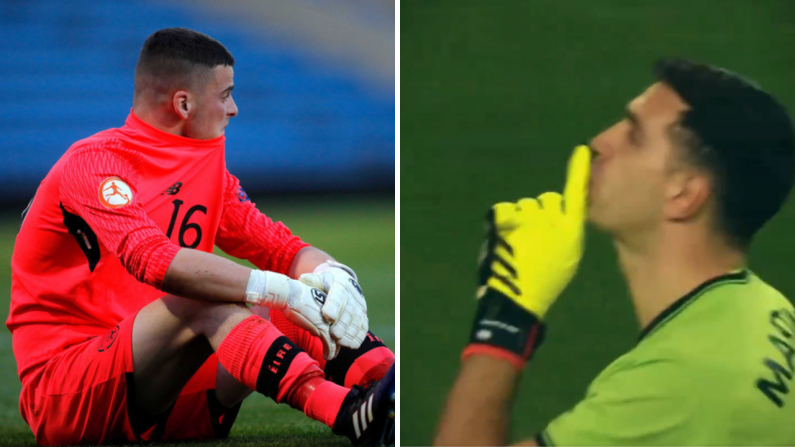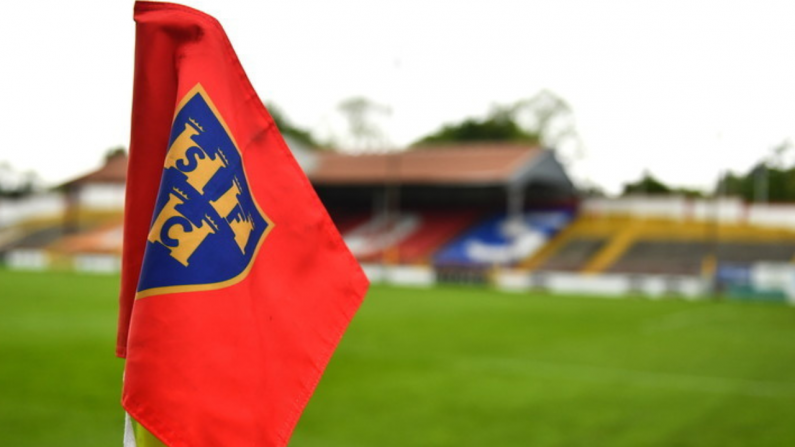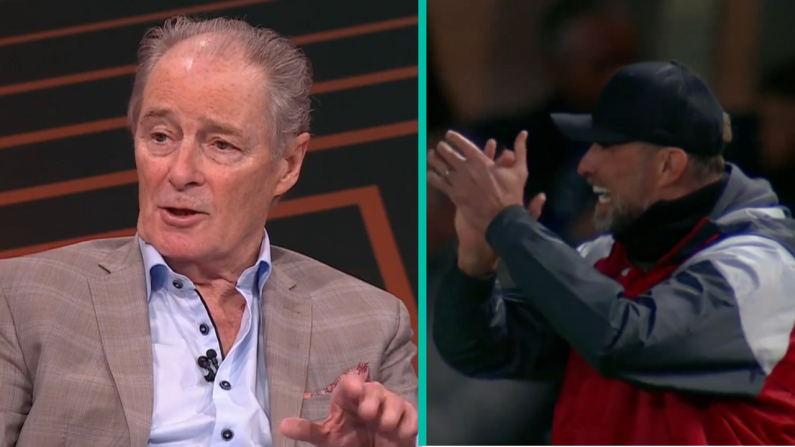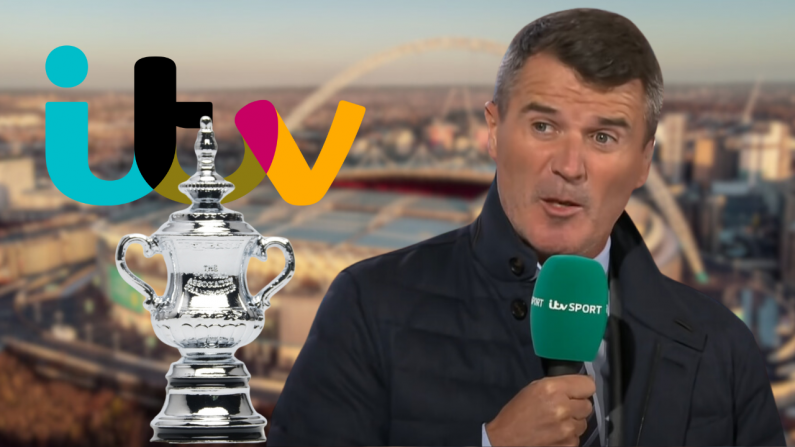Like the impetuous Korean who knocked Italy out of the 2002 World Cup, Ronnie Whelan Snr could have lost his job over it.
The prick this time was not an eccentric and vindictive football chairman from the vanquished nation but a petty jobsworth in charge of a Finglas-based electrical firm.
It was early October and a League of Ireland XI were down to play the English Football League that Wednesday night in Dalymount Park.
Whelan, an employee with Unidaire, was on night shifts that week and had to request the time off. Boldly, he asked could he get the Tuesday and Wednesday off, so he could meet up with the team for the sole training session the evening before.
His immediate superior wasn’t having any of this training nonsense but allowed him the Wednesday off on the basis that he made up the days later on.
He used the time off productively. It wasn’t a waste of an evening off. He proceeded to score the winner against Bobby Moore, Martin Peters and co, as the League of Ireland beat the might of the Football League for the first time in 17 representative fixtures.
The newspapers were disinclined to keep this matter a secret. And so the back pages were filled with incriminating evidence that Ronnie hadn’t been at work the previous evening. Blithely assuming he had secured the evening off, he was unconcerned by this.
His back no doubt aching from all the complimentary slaps, Ronnie landed into work, presumably bracing himself for more of the same. Early on, he was asked go see the boss. Oh really, this is too much! It made sense though. The publicity garnered was probably good for the company. His employer sat brandishing that morning’s paper, and fired out a series of leading questions at Ronnie – to which he must have known the answer. Were you playing that match yesterday? Did you score the winning goal?
The boss then informed him that he was given the wrong impression when he was told he could take the day off. The information that Whelan wouldn’t be into work that Wednesday somehow hadn’t passed up the chain of command. It was a serious matter.
Fortunately, the consequences of Ronnie Whelan’s goal were less grave than they were for Korea’s Ah Jung Hwan when he put the hurt on the Italians all those years later.
While Hwan was sacked by his club chairman, the ludicrous Luciano Gaucci of Perugia (even by the standards of Italian football impresarios, Mr. Gaucci is a freakshow) for the crime of scoring against Italy, Whelan was at least let off with a warning.
He was told that if he did a thing like that again (take time off work we presume, not score against England) he would be fired on the spot.
1 NOVEMBER 2000
Terryland Park was the site of the most recent inter-league game involving the League of Ireland. It was a Wednesday night in early November in the year 2000. Almost 200 people were induced to turn up.
Their opponents were their most frequent sparring partners down the years, an Irish League XI, ie. the IFA League, Linfield, Crusaders, Jackie Fullerton and all that jazz.
The League was hobbled by the absence of Bohs' players, that season's eventual Double winners, and slumped to a 2-0 defeat. Ironically, the Irish League's goals were scored by two League of Ireland stalwarts, Dubliner Vinny Arkins, then with Portadown, and Shelbourne icon Mark Rutherford, at that stage with Newry Town.
Since then, the League of Ireland XI, rebranded as the Airtricity XI, have only appeared in absurd, debasing summer fixtures against Premiership royalty, where they have invariably been pummelled in front of scores of cheering kids and their parents - usually sporting the opposing team's replica shirts.
Inter-League games were a regular occurrence in the black and white era – a natural and accepted part of the calendar. The League’s record in these fixtures was not brilliant. The year before, they had gone to play the Scottish League in Celtic Park, where they proceeded to concede eleven goals.
Bohemians player, and thus an amateur, Willie Browne, part of the side that humbled the Football League a year, was also part of the team that got spanked in Glasgow. The Irish Times' long-standing football correspondent, Peter Byrne was told a story about the adulation those players were showered with on the streets of the capital.
He was walking down the street a week later and he met this Dublin fella coming up and he said 'Hey Willie, I know why you were selected for that team that played in Glasgow. You're an accountant by profession aren't you?' And Browne said, 'I am', He said 'the only reason they brought you to Glasgow was to count the goals going in against the Irish.'
The League of Ireland had recorded good results down the years. They beat the Scottish League 2-1 on St. Patrick's Day 1939 (goals from Waterford United's Johnny Johnstone and Paddy Bradshaw of St. James's Gate) and often won against the Welsh League and the Northern Irish League - though their historical record against the latter was slightly worse than 50:50.
They had failed to win in sixteen meetings with the Football League up to 1963, a run which incorporated of two 9-1 defeats They had achieved a celebrated 3-3 draw in 1956 (thanks to goals from Liam Touhy and a late comical equaliser from Dermot Curtis) so at least the Vitas Gerulaitis-Jimmy Connors line didn't apply. But a win still seemed like a fantastical prospect.
'IT WAS EFFECTIVELY ENGLAND'
Three years before he and his teammates paraded the Jules Rimet trophy around Wembley, Bobby Moore came to Dalymount Park and went home a loser. Fellow World Cup winners Martin Peters, Ray Wilson and Roger Hunt had the same story to tell.
If an elite Premier League XI were assembled to play today (obviously only possible as part of some herculean charitable fundraising drive following a natural disaster so cataclysmic that even the most churlish and self-interested club manager couldn’t in all conscience object to the fixture) the selected side would be a patchwork of nations. It would be touch and go whether any English players would make it.
Not so in 1963. Among supporters and journalists, the terms ‘Football League XI’ and ‘England’ were used interchangeably.
There were sound reasons for this linguistic flexibility. The Football League XI and England teams shared a number of similarities. The players for instance. And the manager, Alf Ramsey had assumed the England job in May of 1963. He assumed responsibility of the representative League team at the same time.
The Football League side that came to Dalymount were missing their full complement - but not because their factory bosses were hemming and hawing about giving them the time-off. Manchester United, Spurs and Everton players (three teams near the top of the English league), for instance, were conspicuous by their absence, for the very good reason that all three had League games that week. Superstars like Bobby Charlton and Jimmy Greaves were thus tied up and didn't make the trip to Dublin.
Four clubs were represented. That season’s eventual league champions Liverpool provided four players - Hunt , right back Gordon Milne, midfielder and Anfield record appearance maker Ian Callaghan, and Jimmy Melia.
Three players came from a classy and youthful West Ham team - on whom Ramsey wanted to base his playing style as England boss - the two World Cup winners Moore and Peters, and Johnny 'Budgie' Byrne, the son of Irish parents.
The man who informed Jack Charlton he had got the Ireland manager 23 years later captained 'England' that night. Jimmy Armfield was the Football League's most experienced player and had captained the national team 15 times. His Blackpool teammate, Tony Waiters was in goal.
The remaining two players came from Second Division side Huddersfield Town, future World Cup winner Wilson and the winger Mike O'Grady, who would later, along with many ageing English stars, play a couple of League of Ireland matches in the mid-70s, for Cork Hibs. The lure of Los Angeles now supersedes that of Turners Cross or the RSC for footballers touching retirement.
'YOU'D NEARLY MAKE AS MUCH PLAYING HERE'
Before television bulldozed in and upset the status quo with its promises of foreign glamour, the League of Ireland was a treasured entity - especially in Dublin.
The 1950s is generally recognised as the golden age of the League of Ireland, an era enlivened by a genuine northside-southside rivalry between the two best teams in the League, Shamrock Rovers and Drumcondra FC. Players and owners got used to crowds of 15,000 or 20,000 watching their clubs. By the early 1960s, crowds were still holding up well. Thousands of bicycles were propped up on the streets of Milltown on the day of a big game. That ground in particular, seems to hold an almost mystical significance for grey-haired League of Ireland supporters, even among those who supported Shamrock Rovers' rivals.
The gap between the English League and the League of Ireland, while substantial, was not the chasm it is now. Nor was a career in the League of Ireland viewed as a depressing consolation prize.
Johnny Fullam, for instance, had come home from Preston two years previously. After playing alongside Tom Finney during the legend’s final season, Preston North End were relegated to the Second Division the very first season after Finney’s retirement (maybe giving credence to the old line about Finney being eligible for income tax relief on the basis of his ten dependents) and a homesick Fullam came back to Dublin.
His personal record at Deepdale was very respectable but life in Dublin, playing part-time in the League of Ireland, was more attractive to him at the time.
Money-wise, England-based footballers did not then occupy a different universe to Ireland-based players. Rovers winger Tony O'Connell, who terrorised Jimmy Armfield that night, had recently agreed a deal with Malcolm Allison to sign for Toronto City. His performance that night against the Football League was described as a 'going away present' in the Irish Times.
Even in wages you’d nearly make as much playing part-time here with a job as you would playing in England in the early 60s… If you were going to England at that time, you were going to get £35 a week and that was it. Whereas if you’d a job here, you’d have got £17 a week and you might get a tenner a week for the football.
It was a bit of a Dublin party that night. Peter Fitzgerald, the Waterford United attacker, was the only member of the team from a provincial side.
Willie Browne, the accountant charged with totting up all the goals scored in Glasgow, grew up in Longford, and played with Longford Town (unarguably, the greatest football team in Ireland - see here) but by the early 1960s, was playing centre half for Bohemians. Browne would be the last amateur to play for the Republic of Ireland national team - a record that didn't appear to be in doubt until Steve Staunton picked the famous Joe Lapira 43 years later.
O'Connell was born in Tralee - there can't have been many more Kerry born players to win international caps - but spoke with a Dublin accent and spent almost all his career, save for one season in Canada, with Dublin clubs.
The goalkeeper earned a memorable cameo role in Eamon Dunphy's 'Rocky Road' memoir. Grey-haired and not especially athletic Eamonn 'Sheila' Darcy belonged, as Chris O'Dowd might put it, to the grand tradition of eccentric goalkeepers.
An obligatory feature of the Shamrock Rovers-Drumcondra fixture back in the 1950s was the to-and fro- between Darcy and the Drumcondra fanbase, which involved them barracking him about his various foibles and imperfections and him responding by alerting them to the scoreline, via whatever number of fingers were necessary - Rovers were usually winning these games.
In the summer of '63, he went ahead and joined Durmcondra himself. He was the only Drums player to feature that night (though Billy Dixon was twelfth man).
The defence featured two Shels men, Paddy Roberts, who worked as a waiter in the Gresham Hotel, and the captain Freddie Strahan. Shelbourne were still flying high in the early 1960s, and were League champions in the 1961-62 season. Before long they would drift into the wilderness, where they remained until Tony Donnelly took over the club in 1989.
Ronnie Whelan, when he could get time off, played for St. Patrick's Athletic, then a respectable mid-table side, who had last won the league in the 1955-56 season and wouldn't do so again until the early 90s.
The remaining five players came from the aristocrats of Irish football. Coad's Colts had dominated the League of Ireland in the 1950s and Rovers would go to win the League in the 1963-64 season.
In addition to O'Connell and Fullam, Rovers boys who played that night were John Keogh in defence and Eddie Bailham and Jackie Mooney in midfield. The side were managed by the Shamrock Rovers boss Sean Thomas.
THE GAME
Jimmy Magee has been bestowed with the title of 'memory man' for his misty-eyed recollections of sepia tinged heroes. If anything, Peter Byrne has more of a claim to this mantle.
The Irish Times man relays the details of the night with the precision, clarity and formality of a match report published the following day.
RTE was nearly two years on the air at that stage but they didn't screen the game live. Not even British Pathe, a treasure trove of old football clips, invariably accompanied by a charmingly antiquated, plummy voiced British commentary, boasts any footage of the game.
When it started off, England, as pedigree suggested, were very much the dominant team. Ireland had Johnny Fullam playing as a sweeper behind Strahan and they needed all of that. Darcy saved an early shot by Hunt and then Hunt missed the post by inches with his next shot.
Peter Byrne
For inter-league games, as with rugby tours in the charming, shambolic amateur era, it wasn't an article of faith that the ref needed to come from outside either of the two competing territories. Until well into the 1980s, New Zealand were never reffed, in games played at home, by anyone other than a New Zealander. Rugby, it seemed, was one step up from snooker, the sport where people call fouls on themselves.
The home team provided the ref and Dubliner John 'Pip' Meighan stood up. He proved his credentials as a neutral when he gave England a penalty early on.
After about 15 or 20 minutes, Byrne got away from Strahan, went around Darcy and as he was going around him, Darcy took him down. Pip Meighan had no hesitation in pointing to the penalty spot. It wasn't a popular thing to do with all the Dubs shouting.
Peter Byrne
33 mins: Byrne took the penalty himself.
He put it to Darcy's right. Darcy dived, knocked it against the upright and the ball, fortunately, came back into his arms.
Peter Byrne
Eamonn Darcy saved a penalty that night, he stuck it onto the post. He was telling me he was talking to Roy Prole (former Drumcondra owner) and Prole was watching them (England) training and he was telling him where Byrne put penalties and so when he got one, Darcy knew where it was goin'.
Tony O'Connell
38 mins: England lead 1-0.
Hunt beat left full Browne and was working his way through the area when Darcy advanced and attempted to dive to dispossess him. Hunt swept by him and crossed from the back line to the waiting Byrne who headed home.
Irish Independent
They got to half-time and took stock. The English would have been frustrated to be only 1-0 up but they wouldn't have unduly worried. The Irish showed little indication that there was a shock in store. However, the English grew more diffident as the game wore on, the Irish grew more emboldened...
56 mins: Tony O'Connell crashes shot off the post. He continues to give Jimmy Armfield terrible trouble down their wing.
...an Irish free taken by Roberts went to O'Connell in the area on the left. His shot had Waiters beaten but crashed off the upright and back into play only to be scrambled out.
Irish Independent
Basically speaking, I had a very, very good game. Jimmy Armfield was a gentleman and he didn't put me up in the air (laugh). You don't get 100 caps for England without being a fantastic player. It was just on the night, if your midfielders are good and they're giving you the ball and you're getting space to go at them. It wouln't have been as tight a game as it is now and I was going by him all-right. It would have been an exceptional night for me. But you get that nights like that and then you get nights when you're better off not going out.
Tony O'Connell
64 mins: The League of Ireland equalise. 1-1 - Eddie Bailham
O'Connell again forced Armfield to the limits of his ability and earned a corner. The left-winger's kick was flashed out to Bailham, whose shot from 25 yards rocketed into the corner and had Dalymount Park a roaring inferno.
Irish Times
Bobby Moore headed the ball out but only as far as the edge of the penalty area, where, fortunately for the Irish, Bailham was standing. Ball came directly into his path and he had a tremendous belt of a ball, particularly from distance...
Peter Byrne
Eddie never headed the ball so he was told to stay outside the box. So he stayed on the arc outside the box and the ball was crossed over and it came out to him and he smacked it in.
Tony O'Connell
70 mins: Whelan misses sitter. 1-1
Paddy Roberts took a free-kick from about 30 yards. It hit the underside of the crossbar and came to Ronnie Whelan and from about three yards out, he headed the ball directly into Tony Waiters hands. The crowd were beginning to give him a bit of stick. by rights he should have scored because he was only about three yards out.
Peter Byrne
79 mins: League of Ireland take the lead. 2-1
The crowd were sent into ecstatics when the League of Ireland took the lead. Fullam sent an indirect free kick to the square, Bailham got his foot to it and wrenched it on to Whelan who shot the net from close range.
Irish Independent
Fullam's free reached Eddie Bailham who touched it on to Whelan, and Ireland's new international steadied it beautifully and sent it crashing well out of reach of Waiters, the Balckpool goalkeeper.
Irish Times
85 mins: Hunt smashes ball off the crossbar. 2-1
...Darcy was beaten by another shot from Hunt and it crashed off the bar and back into play
Irish Inependent
89 mins: Crowd mistake free to England for the final whistle
When referee J Meighan blew for an English free a minute from time the spectators mistook it for the final blast and swarmed onto the field. Play was held up while police cleared the pitch but only after another 60 tantalizing seconds the attendance were able to give full vent to their acclaim and their relief.
Irish Independent
Game over - the pitch invasion can proceed without police interference.
‘CARVE THEIR NAMES WITH PRIDE’
The big movie in town at the town was a film honouring British war hero Violette Szabo executed by the Nazis in 1945. 'Carve Her Name With Pride' won Bafta's (there was no Ifta's) and garnered plenty of fanfare.
The Irish Independent leant on this spirit in their coverage of Ireland's win the following day. 'Carve Their Names In Pride' was emblazoned across the back page of the paper, honouring the part-timers and one amateur (nine Dubs, one Waterford man and one Longford man) who defeated the sleek professionals of the Football League.
The Lord Mayor of Dublin, Sean Moore turned up in the dressing room and told them that logic dictated that Ireland were destined to win one of these games at some stage. He then went into the English dressing room and told them he was sure they'd bounce back and win again - so long as it wasn't against Ireland.
George Lax, the Bohemians coach, sounded more like a sensitive League of Ireland stalwart responding to some Roddy Collins jibes, circa 2014, than a creature from the supposed golden era of Irish football, when he told the Irish Press 'Now our boys have shown that the standard of football here is not as bad as people think.'
Alf Ramsey was sober and decidedly non-hysterical after the game, remarking, not petulantly, that 'we were the better footballers but the Irish ran us into the ground in the second half.'
Shortly after Ramsey and four of his survivors from Dalymount lifted the biggest prize of the lot, the English club game would ascend into the stratosphere. It would soon become obligatory for Irish kids to support English club teams. By the early 70s, every kid in Ireland seemed to support Leeds (and by the 90s, every Dad in the country still supported Leeds). The Irish club game was swallowed up. Ironically, its heydey is a decade now regarded as one of the bleakest in Irish history.
Perhaps owing to the decline of the inter-league fixture, this miraculous act of giant killing hasn't aged well in the public memory. There are no ballads, no documentaries, no mentions on Reeling in the Years and certainly no stage plays.
But at the time, it was regarded as a seminal moment.
It was huge. It was the biggest thing that ever happened for a League of Ireland side. It would have been similar to Munster beating the All Blacks. It would have been an upset of similar scale
That evening the supporters crowded out Mooney's Bohemian Bar on Doyle's corner and the Ivy House near Tolka Park. The players, in the main, went home. Tony O'Connell recalls the wild night.
We got ten pound and we all went home. And we weren't even allowed take the jerseys (laughs).
Back row: Jack Mooney (Shamrock Rovers), Tony O'Connell (Shamrock Rovers), Eddie Bailham (Shamrock Rovers), (John Delaney), Billy Dixon (Drumcondra), Paddy Roberts (Shelbourne), Ronnie Nolan (Shamrock Rovers), Johnny Fullam (Shamrock Rovers)
Front row: John Keogh (Shamrock Rovers), Eamonn Darcy (Drumcondra), Patricia Browne (wife of Willie Browne - Bohemians, died 2004), Freddie Strahan (Shelbourne)
Absent: Peter Fitzgerald, (Waterford United - died 2013), Ronnie Whelan Snr. (St. Patrick's Athletic - died 1993)

